Lost In Myth: The Message of “Recon”—Learning to Let Go
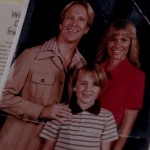 In “Recon,” James Ford learns a life-changing lesson from a TV show just as we are learning from Lost. The metaphor is clear: there are messages in the media that are meant to help guide us on our journey. All you have to do is let yourself see through to their true meaning in order to uncover the wisdom.
In “Recon,” James Ford learns a life-changing lesson from a TV show just as we are learning from Lost. The metaphor is clear: there are messages in the media that are meant to help guide us on our journey. All you have to do is let yourself see through to their true meaning in order to uncover the wisdom.
At some point in our lives, most of us have experienced a major trauma, loss or mistreatment that has scarred us. The question is, do we let this pain and hurt grow inside of us, causing us to become bitter our whole lives, or do we learn to let go?
Since he was a boy, James has been consumed with the guilt, pain, and hatred from a severe childhood trauma he experienced—his mother’s murder by his father and his father’s subsequent suicide before his eyes. This deep scar has made James obsessed with tracking down and killing Anthony Cooper, aka Tom Sawyer—the man who conned his parents out of their life savings and led to his father’s meltdown.
While this situation is hopefully so much more severe than anything we will ever have to experience in our own lives, the exaggeration exists for a reason. The reason is so that we may process the wisdom without consciously fighting it because its truth hits too close to home. In other words, like the issues of all the characters on Lost, James lesson is really for us.
When we first met James on Lost, his issues were so deep he had taken on the persona of Sawyer including his name and profession. His self-hatred was so intense, he was a masochist, looking for a beating whenever possible. This aspect of James’ personality was revealed when he claimed to have stolen Shannon’s asthma spray in Season 1. This led to his torture by Sayid until he finally revealed that he had, in fact, never even seen it. The message was that James simply hated himself and felt he deserved whatever beating he could get. He hated himself because he had become the person he hated the most—Sawyer.
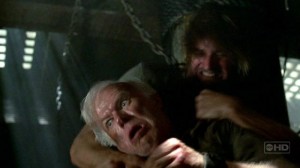 James carried this pain around with him until he was able to exorcise his demons by killing the man he believed to be Sawyer in the Season 3 episode, “The Brig.” I say “believed” because it is still unclear who this man really was and how he got to the island. Whether or not the man James killed was really the actual man who conned his parents though is irrelevant. The important thing was that he believed that it was and thereby was able to resolve his issues.
James carried this pain around with him until he was able to exorcise his demons by killing the man he believed to be Sawyer in the Season 3 episode, “The Brig.” I say “believed” because it is still unclear who this man really was and how he got to the island. Whether or not the man James killed was really the actual man who conned his parents though is irrelevant. The important thing was that he believed that it was and thereby was able to resolve his issues.
As I wrote in The Myth of Lost, “In classic psychology, repressed hatred must be purged from the subconscious in order to alleviate its symptoms. One does this by bringing it to the conscious mind, coming to terms with it there, and finally disposing of it.” This may explain why many of the characters on Lost, from John Locke to Ben Linus, have had to kill (or witness the killing) of their fathers. They had to purge them from their minds. For James, the reasoning is the same, only his issue is not as much with his father as with the man he deems responsible for his death.
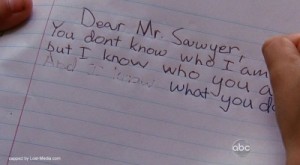 After killing Sawyer, James began to lose the self-hatred and anger he’d been carrying around with him for so long. No longer a bad guy, he became a very likable character. But while he had resolved his issues regarding the perpetrator of his parents’ deaths, he had never come to terms with the deaths themselves. He had been so full of anger, he had never let himself grieve. Instead, he channeled his pain into the letter he wrote at his parents’ funeral—a letter that Jacob helped him finish. It remains to be seen if Jacob’s intentions were meant to help or hinder James, but I think overall, it helped him. At least the letter gave James a goal. Yes, it caused him to internalize his pain, but at least it was contained. And once contained, it could be eliminated.
After killing Sawyer, James began to lose the self-hatred and anger he’d been carrying around with him for so long. No longer a bad guy, he became a very likable character. But while he had resolved his issues regarding the perpetrator of his parents’ deaths, he had never come to terms with the deaths themselves. He had been so full of anger, he had never let himself grieve. Instead, he channeled his pain into the letter he wrote at his parents’ funeral—a letter that Jacob helped him finish. It remains to be seen if Jacob’s intentions were meant to help or hinder James, but I think overall, it helped him. At least the letter gave James a goal. Yes, it caused him to internalize his pain, but at least it was contained. And once contained, it could be eliminated.
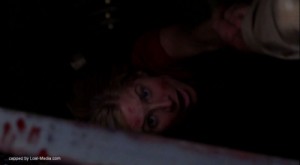 After killing Sawyer, since James was still carrying around unresolved grief over his parents, the island tested him again. This time the test involved a love relationship—a relationship that would come to a tragic end with Juliet’s death in “LA X.” After Juliet’s death, James regresses to his pain-body self by blaming the death on Jack. Much like with Tom Sawyer, James swears to get revenge by killing Jack. Only, he doesn’t. Sure, he releases some pent up anger by beating on him, but stops far short of killing him. The reason is because he has grown. Not fully, but enough to lead to the life we see in his flash-sideways.
After killing Sawyer, since James was still carrying around unresolved grief over his parents, the island tested him again. This time the test involved a love relationship—a relationship that would come to a tragic end with Juliet’s death in “LA X.” After Juliet’s death, James regresses to his pain-body self by blaming the death on Jack. Much like with Tom Sawyer, James swears to get revenge by killing Jack. Only, he doesn’t. Sure, he releases some pent up anger by beating on him, but stops far short of killing him. The reason is because he has grown. Not fully, but enough to lead to the life we see in his flash-sideways.
Regardless of when the flash-sideways are actually taking place, it makes the most mythological sense that they represent the epilogue of the characters’ lives—after their experience on the island. Thanks to the growth he experienced on the island, James is a much better adjusted character than we saw from his original flashbacks. He has sublimated his conning abilities for good—working as an undercover cop to help the law bust other con artists.
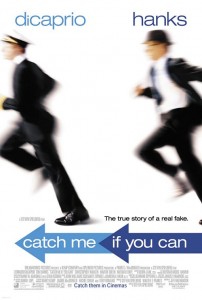 The mythology is the same as the one from the movie Catch Me If You Can where the former con artist Frank Abagnale Jr. eventually comes to work for the FBI to help them uncover other con artists. Of course, in this case, the movie was based on a true story. All our life stories are based on mythology. That’s why the myths are able to help us. It’s just that some life stories are made into movies and some aren’t. But even if yours hasn’t been made into a film, there is a film with the same message. Or at least, a character on Lost.
The mythology is the same as the one from the movie Catch Me If You Can where the former con artist Frank Abagnale Jr. eventually comes to work for the FBI to help them uncover other con artists. Of course, in this case, the movie was based on a true story. All our life stories are based on mythology. That’s why the myths are able to help us. It’s just that some life stories are made into movies and some aren’t. But even if yours hasn’t been made into a film, there is a film with the same message. Or at least, a character on Lost.
Unlike Jack and Hugo (those who have sided with Jacob), James has not been fully redeemed on the island. If he is to be redeemed, he will need to do so in his flash-sideways. I am assuming that Jack will be redeemed while still on the island because his flash-sideways has shown that he has resolved his issues. While we haven’t seen Hugo’s flash-sideways yet, I feel that he too will be redeemed because he seems to have already resolved his issues while on the island. Perhaps not with food, but I’ll hold off on commentary about that until his centric episode. His bad luck issues though seem to have been resolved. James, on the other hand, still has hang ups about Sawyer in his flash-sideways, so it would seem that he is not yet fully redeemed on the island. Perhaps this is because he sided with MIB/Locke, or, simply sided with no one.
Having lost someone very close to him, it is completely healthy for James to grieve for Juliet and let himself feel pain. But he must let himself feel this pain and not push it away, letting pain and bitterness consume him. He cannot project his feelings onto Jack, but let himself come to terms with them. Eventually, James must learn to love again. Mythologically speaking, that woman will likely be Kate, and that seems to be where his intentions are heading both on and off the island. (However, those intentions may wind up with Juliet off the island as insinuated with Juliet’s dying words about getting coffee some time.)
The challenges and experiences that James faces on the island are reflected in his flash-sideways. In fact, this is the case for every character. This reflection has been symbolically portrayed in every single flash-sideways so far by the central character’s reflections: James punching the mirror in “Recon,” Ben looking at his reflection in the microwave in “Dr. Linus,” Sayid seeing himself in the window at Nadia’s house in “Sundown,” etc. The message is that both the growth and unresolved issues that the characters face on the island will be reflected in their off-island lives. It’s just like how the issues our souls want to resolve before we come to this world are reflected in the life scenarios we play out on this planet. Our entire lives are set up in order to help us experience the challenges our souls want us to overcome, and in doing so, help others to do the same. Everything else is just details.
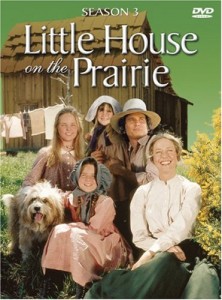 To help us on our life journey we meet the right people at the right time, and we get clues from the universe including messages from the media. Since Lost is a major clue-giver for us, it is letting us know that these messages can be very helpful. It does this in “Recon” by showing how James comes to learn a life-changing lesson by watching, Little House on the Prairie. Who would expect that a tough undercover cop like James Ford would watch a seemingly sappy seventies show like that? Once again, the exaggeration is meant to provide insight to our own truth. That if Little House can provide meaning for James, surely Lost can provide meaning for us. Chances are, you aren’t as cool as James, and Lost isn’t as sappy as Little House. So if the message works in that exaggerated scenario, surely it could work in one that’s even more believable.
To help us on our life journey we meet the right people at the right time, and we get clues from the universe including messages from the media. Since Lost is a major clue-giver for us, it is letting us know that these messages can be very helpful. It does this in “Recon” by showing how James comes to learn a life-changing lesson by watching, Little House on the Prairie. Who would expect that a tough undercover cop like James Ford would watch a seemingly sappy seventies show like that? Once again, the exaggeration is meant to provide insight to our own truth. That if Little House can provide meaning for James, surely Lost can provide meaning for us. Chances are, you aren’t as cool as James, and Lost isn’t as sappy as Little House. So if the message works in that exaggerated scenario, surely it could work in one that’s even more believable.
Having not fully redeemed his character on the island, James still has issues to deal with off the island. These issues come to a head when he blows up at Charlotte after she “accidentally” discovers his file on Sawyer. I put “accidentally” in quotes because the universe created that event so James could come to terms with his issues. Just as Jacob gave young James the pen to finish his letter, just as he also showed Jack that he had been watching him, and just as those trying moments have happened in your own life to help you on your path.
I myself have recently experienced such a challenge. I lost my mom to pancreatic cancer last week after her 3½ month-long battle. Like all other challenges, I believe that this too serves a higher purpose. As I said at my mom’s funeral, she had taught her family many lessons during her lifetime, but her final lesson could not be taught while she was alive. That lesson was how to live without her.
Perhaps because I am so attuned to it, or perhaps because I live in the reality that only exists from my perspective (as yours exists only from yours), but I’ve noticed that each episode of Lost has focused on the exact issues that I have been dealing with that particular week. Last week, when I was first coming to terms with my mom’s passing, Lost had an episode about coming to acceptance when your life doesn’t turn out like you thought it would. (See “The Lesson of ‘Dr. Linus’—What About You?) Like many people, I’d always assumed my mom would be around to see her grandchildren and that her affectionate and fun-loving personality would help shape their own personalities. Lost helped me begin to come to terms with the reality that this presumed scenario would never come to pass. This week, as I was going through the early stages of the mourning period, there was an episode about learning to let go from loss. And within that episode, a message from another TV show—one that I grew up with.
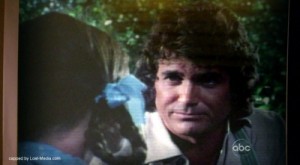 The words of Michael Landon’s Charles Ingalls were so timely and relevant, they seemed to be directed specifically at me. His message was that life is too short to be spent holding onto pain and worry. And that we should just take the positive lessons and memories of the people who have been close to us and let the rest go. And that in the end, just maybe, we’ll get to see them again. Perhaps I look too deeply into the messages of these episodes in personalizing them so much, but it’s hard to deny their synchronicities.
The words of Michael Landon’s Charles Ingalls were so timely and relevant, they seemed to be directed specifically at me. His message was that life is too short to be spent holding onto pain and worry. And that we should just take the positive lessons and memories of the people who have been close to us and let the rest go. And that in the end, just maybe, we’ll get to see them again. Perhaps I look too deeply into the messages of these episodes in personalizing them so much, but it’s hard to deny their synchronicities.
Of all the TV shows from the past that have ever had a message about dealing with death, Little House On The Prairie seems like an odd choice for Lost. I cannot tell you what relevance such a show might have for you, but I can tell you what it meant for me. Michael Landon was born Eugene Orowitz. In and of itself this is pretty interesting given that it shares a prefix with my own name, Oromaner. (“Oro” means “gold,” coming from the root for “light.”) Orowitz grew up in Forest Hills, NY where I lived for four years with my brother. This is also very interesting, but not quite enough to give me chills. After reading up a bit more on Michael Landon’s life however, this did: he died after a 3-month battle with pancreatic cancer. For me, the message was clear: a confirmation that the message of the episode was definitely for me.
One thing I hope to accomplish in writing these columns is to teach readers to do these interpretations for themselves. I can only interpret generalizations or how episodes can relate to me personally. As for how they can help you with the specific issues of your life, only you can figure that out. I’d like to think that I’m helping by providing the tools, but you’ll have to master actually using them. With the help of Lost and the other clues the universe provides, I think most of us will one day become master carpenters, building impressive structures that just might help keep this world together. Good luck, we’re all counting on you.
Marc Oromaner is a New York City writer whose book, The Myth of Lost offers a simple solution to Lost and uncovers its hidden insight into the mysteries of life. He can be contacted in the discussion section of The Myth of Lost Facebook page.
The Myth of Lost is available on Amazon and barnesandnoble.com.


